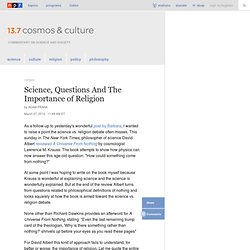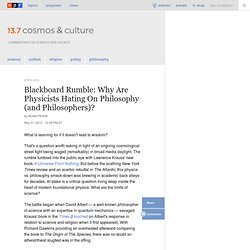

Aristotle on Eudaimonia - John Lloyd Ackrill. Science, Questions And The Importance of Religion : 13.7: Cosmos And Culture. As a follow-up to yesterday's wonderful post by Barbara, I wanted to raise a point the science vs. religion debate often misses.

This sunday in The New York Times, philosopher of science David Albert reviewed A Universe From Nothing by cosmologist Lawrence M. Krauss. The book attempts to show how physics can now answer this age-old question: "How could something come from nothing? " At some point I was hoping to write on the book myself because Krauss is wonderful at explaining science and the science is wonderfully explained. But at the end of the review Albert turns from questions related to philosophical definitions of nothing and looks squarely at how the book is aimed toward the science vs. religion debate. None other than Richard Dawkins provides an afterword for A Universe From Nothing, stating: "Even the last remaining trump card of the theologian, 'Why is there something rather than nothing? ' I have to agree.
Untitled. Arthur Zajonc Interview by Otto Scharmer. Claus Otto Scharmer Arthur Zajonc Arthur, what questions have been organizing your work? What was the context of your own life that first gave rise to these questions? That goes back more than 30 years to my initial study of physics, which was primarily animated by a longing to come to a deep insight or understanding of the world around me. I was probably pretty naïve when I was 20 years old, but that was the animating hope. When you were 20 years old, you ventured into studying physics. At the University of Michigan. Where did your folks come from?
Childhood: Living in Two Worlds My father came from a Polish family. Where was that? In New York City, Staten Island. But as a child, I saw these as simply two worlds, two grandparents, and two communities, one the elegant South and the other, the immigrant population of the Northeast. I’ve been grateful for both of those worlds. When you’re 18 or 20, you don’t have a lot of clarity. Entering University in 1967 An Empty Vessel Never? Yes. Why Are Physicists Hating On Philosophy? : 13.7: Cosmos And Culture. What is learning for if it doesn't lead to wisdom?

That's a question worth asking in light of an ongoing cosmological street fight being waged (remarkably) in broad media daylight. The rumble tumbled into the public eye with Lawrence Krauss' new book A Universe From Nothing. But before the scathing New York Times review and an acerbic rebuttal in The Atlantic, this physics vs. philosophy smack-down was brewing in academic back alleys for decades.
At stake is a critical question living deep inside the heart of modern foundational physics: What are the limits of science? The battle began when David Albert — a well-known philosopher of science with an expertise in quantum mechanics — savaged Krauss' book in the Times (I touched on Albert's response in relation to science and religion when it first appeared). But the bulk of Albert's review had nothing to do with religion and everything to do with basic philosophy.
So there you go. David Albert was having none of it. About Time: Adam Frank: Amazon.com. Francisco Varela (Neurobiologo) - La Belleza-Del-Pensar-2001.